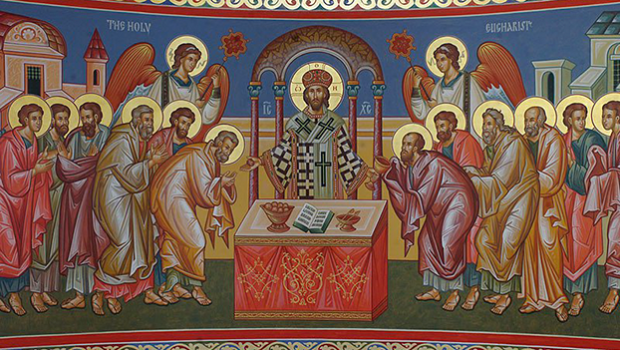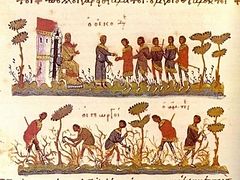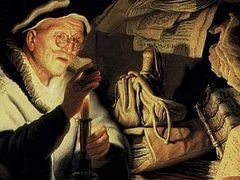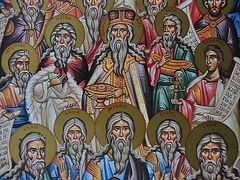
Last weekend in Alhambra, California, the Serbian Archdiocese celebrated the canonization of a San Francisco saint—St. Sebastian Dabovitch. Archbishop Benjamin of San Francisco (Orthodox Church in America) gave a homily about the parable of the wedding feast.
We heard today a reading from the Gospel of Matthew which points after the Transfiguration of Christ, after Christ told His disciples and apostles that He’s going to Jerusalem to be killed, to die and to rise again on the third day. It is among the last things therefore that Christ says to His friends before He leaves and dies. It is a parable, among others, that describes, the kingdom of Heaven, and in it we hear this wonderful story of a table that is set, a wedding feast. As a Christian my mind goes directly to the table behind me, which is not the table of the Last Supper but is the table of the wedding feast of the Lamb described in the book of Revelation where God sits and dines with His beloved, with us, with his holy ones.
The table is a very important part of every household. Certainly it’s an important part in this church—since I’ve been here I have not stopped eating. And eating, sharing a meal together, is a way in which we build community with each other, and in a church—with God. We are invited to dine with Him in His Kingdom. I have a parish in Hawaii. In this parish there was no priest for two years and I told the people that I want them to get together every Sunday and read the Epistle read the Gospel, discuss them and then have lunch together. Eat together. Why is eating so important?
I think it’s one of the primal human characteristics that we can only eat with those people we love. I can’t eat with people I don’t like. I just can’t—I don’t feel like eating. In a household where children are misbehaving at the dinner table what do we tell them to do? “Go to your room.” We tell them “We don’t want to eat with you, and when you act better you can come back and join us.” I imagine two cavemen sitting down and having a mammoth leg, and a third one appears. Now if he’s invited to eat with his friends he knows he’s welcome and there’s peace between them, but if they spurn him and push him away there’s already tension between them. Eating together is a basic human characteristic and it’s a way we show love to each other, it’s a way we build community, and it’s the way God builds community with us.
Another thing about this parable, if you listened very carefully—it is the king who invites his guests. We sometimes forget that Christianity is the only religion in the world where God seeks mankind. Other people seek God, seek nirvana, seek enlightenment, but in Christianity it is God Who searches for us. In the Garden of Eden after Adam and Eve had fallen what does God do? He goes to the garden and He calls to them and He says Where are you? And they are hiding, and God still searches for mankind. He still searches for us and invites us to be his friends and to walk with Him in the cool of the day.
This weekend we are celebrating a great saint, a modern saint. When I was in Russia visiting a monastery there the abbot of the monastery asked me who, besides the Mother of God, is my favorite saint. And I thought for a while and I had to answer St. Herman of Alaska, and he said, “You know, it’s very interesting—the saints that are nearest to us in time and place are the dearest to us because they somehow express who we are, they show us how we too can become God-like, how we too can dress appropriately for the dinner that he king has set forth in this parable.”
St. Sebastian is a holy one of God who polished the lens of his heart through asceticism. He became Christ-like and through his heart Christ shone His light to this world. Each one of us here today who is baptized and chrismated, who has been anointed, who has been made a little Christ—our hands have been made through chrismation God’s hands. We are the way that God reaches out and touches this world. Our ears are the ears through which God hears the cries of the suffering in this world. We are made little christs, and St. Sebastian shows us how to be Christ-like in our modern times, in a time that was not much different from ours. He lived in a world that was rough and tumble. It was certainly no more peaceful then than it is now, and yet he was able to make Christ present through his own person. And it is my prayer for each one of you that you, like St. Sebastian, will polish the lens of your heart so that God can reach down and touch the world through your hands. Amen.



